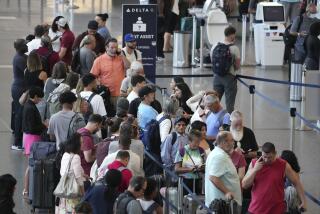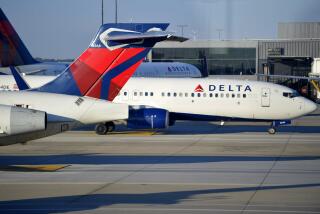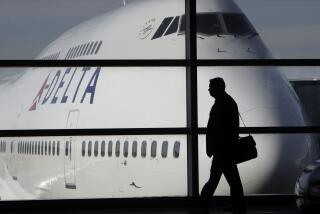Delta Chagrined, but History May Be on Its Side : Travelers’ Fear of Flying Seen as Fleeting if Carrier’s Rash of Problems Subsides
- Share via
NEW YORK — Since a series of mistakes and near-accidents began for Delta Air Lines last month, Sally Jackson of Alternative Travel in Washington says air travelers are indeed asking for an alternative.
“A lot of people have been asking not to fly Delta,” she said. “They have definitely been affected by it.”
For example, a group of 10 people from a large New York brokerage firm switched to United Airlines at the last minute on a trip last week to Florida.
Delta announced Thursday that it would refund the price of tickets to passengers concerned about flying the airline.
How much Delta’s business has been hurt by the problems, if at all, is difficult to tell. Delta spokesman William Berry concedes that passengers have switched to other carriers, but not to any great degree. Delta’s competitors, Eastern Airlines, United Airlines and American Airlines, say they have not seen any great increase in business.
For Delta, the large number of incidents--including wrong runways, wrong airports, near-collisions and a dangerous engine shutdown--comes at the busy summer season when traffic is surging. Thus, if it is losing passengers for reasons of fear, it does not show up because so many other people are flying on their vacations.
Traffic Up Over 1986
According to Paul Karos, airline analyst with L. F. Rothschild, Unterberg, Towbin, a New York brokerage house, Delta’s traffic in the first three weeks in July is up 18% over the same period last year; Delta’s planes are flying with 62% of their seats occupied, compared to 60% last year. “They are adding capacity (seats), and if load factors continue to go up, then traffic is still pretty strong.”
But Karos said Delta is not getting by unscathed. “My guess is that they have lost a fair amount of traffic,” he said, “but overall business is so strong, it is getting swallowed up by that.”
Karos believes that if Delta’s problems subside and there are “no more significant errors, this will go by the wayside pretty quickly.”
But if the mistakes persist or become more serious, continuing bad publicity could scare customers away.
In 1982, Tylenol’s share of the analgesic market, for example, dropped from 35% to 7% after seven people died in a spate of tampering with the Johnson & Johnson product. It took nearly 3 1/2 years for the company to regain its original position. After a second tampering incident in 1986, its position again dropped, but recovered quickly.
When SmithKline Beckman had to take Contac off the shelves because of some tampering, there was a $16-million dent in pretax earnings.
When a man killed 21 people and wounded 19 in a McDonald’s restaurant in San Ysidro, Calif., three years ago, people chose to eat at Burger Kings for a week or so.
But in the long run, Delta and all of these products and establishments have reputations that allow them to make quick comebacks.
“Manipulated images have a very short-term effect,” said Dr. Barry Stein, president of Goodmeasure Inc., a Cambridge, Mass., consulting firm. “It’s the enduring image that sells products. In the case of Delta, they are likely to bounce back because of their reputation of service and safety over many years. They should say, ‘We’ve always been a good company and we’re still a good company. We have some problems and we are going to fix them.’ ”
Airline analysts contend that Delta’s problems are being overblown because it is now being closely watched.
“Delta is under a microscope,” said Timothy Pettee, airline analyst with the New York brokerage house of Bear, Stearns & Co. “Frequent flyers know that minor incidents occur frequently at any airline--engines are shut down; approaches are missed. This has been a rather extraordinary, random series of events. The statisticians are astounded that each one of these incidents involved a Delta jet.”
In fact, U.S. Transportation Department statistics released July 14 rank Delta as the largest carrier with the fewest consumer complaints. From January to June, Delta had 1.5 complaints per 100,000 customers. Continental led the industry in complaints, with 41.93 complaints per 100,000 passengers.
In addition, Delta has continued to retain investors’ confidence throughout all of its difficulties. This year the stock has traded as high as $67 and as low as $46. It closed Friday at $55.
“There has been some pressure on the Delta stock,” Pettee said. “Some unsophisticated retail-type investors have sold the stock because of these incidents. But this has provided an investment opportunity for the sophisticated investors. The institutions have been buying.”
More to Read
Inside the business of entertainment
The Wide Shot brings you news, analysis and insights on everything from streaming wars to production — and what it all means for the future.
You may occasionally receive promotional content from the Los Angeles Times.









